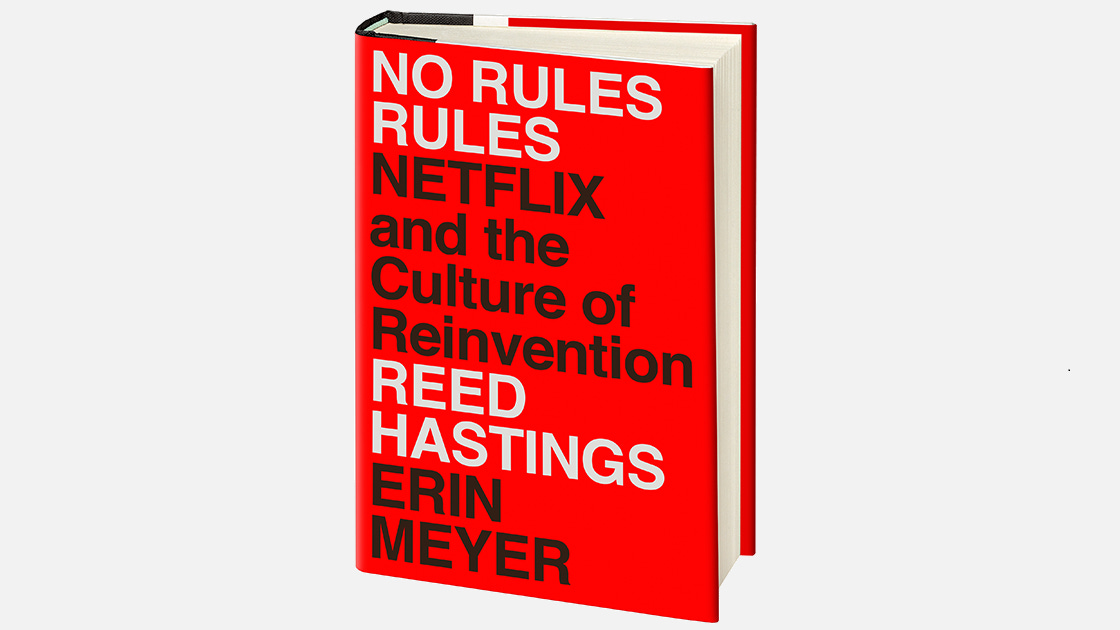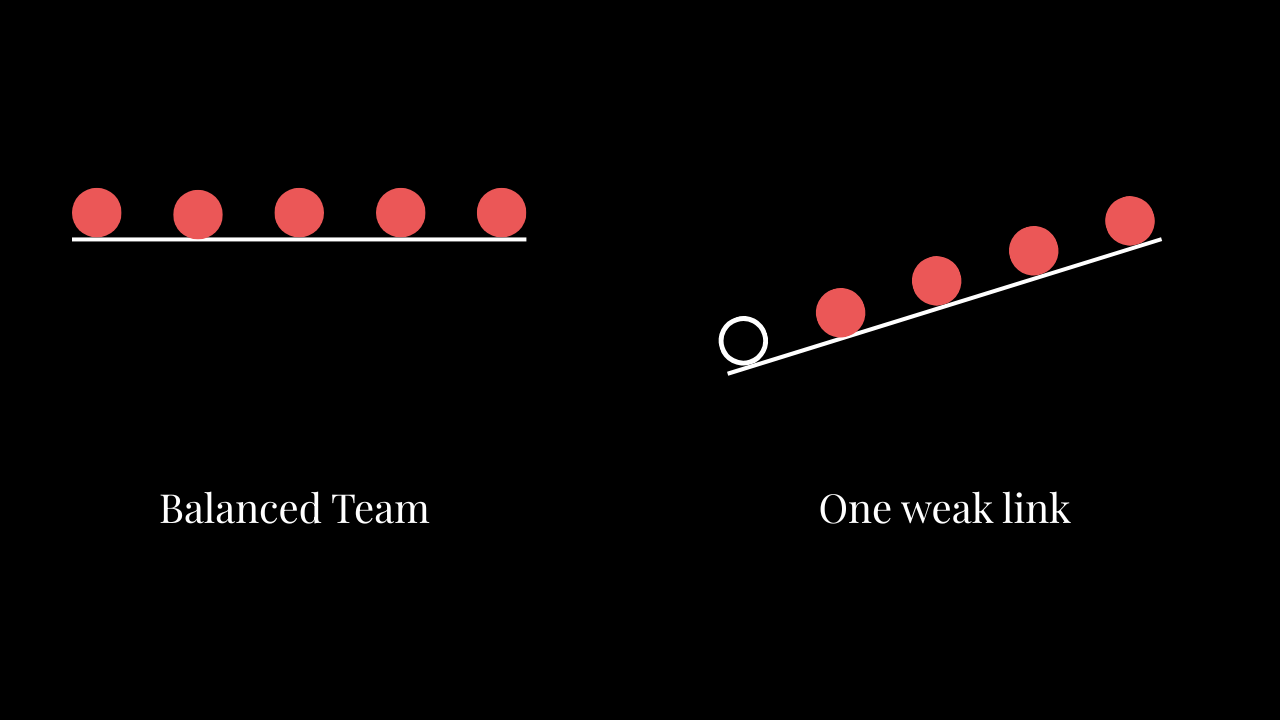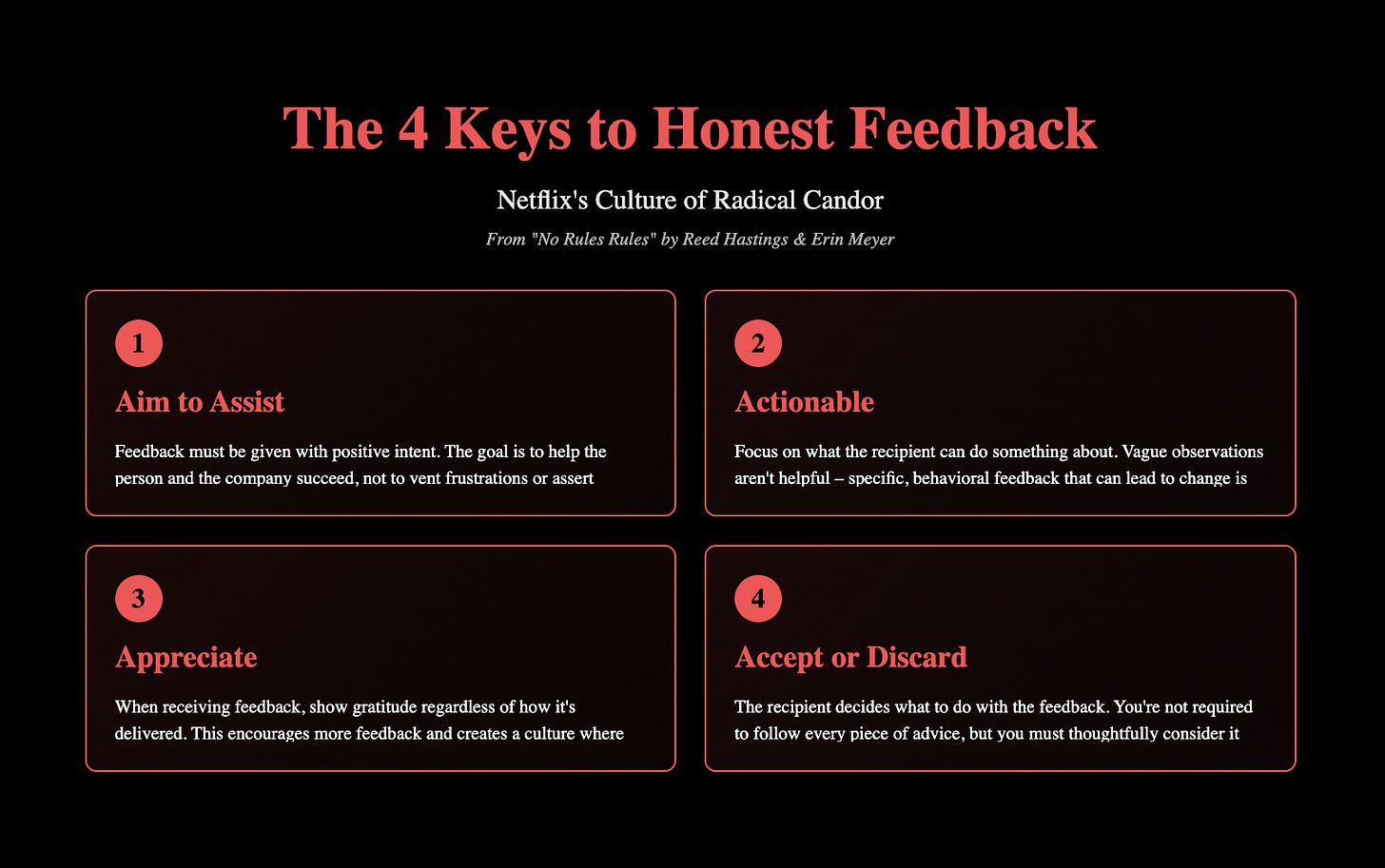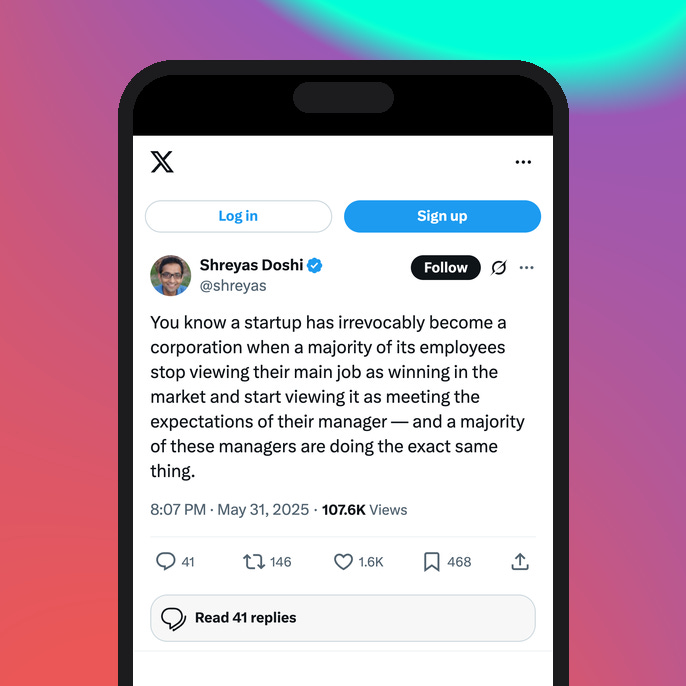This book will change the way you think about working in tech
5 actionable takeaways from 'No Rules Rules'
It’s time for me to share what I’m reading more often and encourage you to read with me (see what I’m reading this month at the bottom of this article!). This past month, I read No Rules Rules by Reed Hastings and Erin Meyers. It’s all about Netflix’s culture: how they set themselves apart from other tech companies, why they do so, and how it puts them ahead.
Most people think this book is a message to company leadership and founders, but there are many takeaways for anyone working in tech too. I can honestly say it’s changed the way I look at working in tech by making me look at my relationship with my employer differently.
Below are 5 actionable takeaways from ‘No Rules Rules’.
Don’t forget: An ML for SWEs paid subscription is only $3/mo until we achieve bestseller status when it will go up to $5/mo. If you’ve found ML for SWEs helpful, become a paid subscriber and lock in 40% off forever.
1. Talent density
Talent density is one of the most important factors that contributes to the success of a team. We see this mentioned all the time on X by startup founders, but it’s usually mentioned as a bragging point for paying less but still getting more work done.
While this may technically be true, this isn’t the reason Netflix focuses so highly on talent density (more on how Netflix pays later). Instead, Netflix focuses on talent density because they’ve seen the impact just one less-driven employee can have on a team.
Even a single employee can hold back a team’s progress if they lack the drive their teammates have or if they can’t keep up with the work being done. This is why Netflix focuses on teams having fewer, but more talented people; teams can move fast and achieve more without holdups.
Netflix puts a lot of effort into hiring the right people to make this happen. No Rules Rules repeatedly teaches that the biggest factor of a company’s success is whether or not they hire the right people. Hiring great people has an impact on every section within this article.
Your takeaway here: Surround yourself with talented individuals who have the same drive to achieve that you do. You’ll get ahead faster and achieve more with a great supporting cast.
2. Value honesty and feedback
Now that you’ve surrounded yourself with an incredible team, you need to take advantage of having that much talent so near to you. The best way to do this is to be part of an environment where honesty is valued.
Your best learning resources (by far!) are your talented teammates. They know your work and have experience working with you. Tapping into their feedback is the best way to understand how you can improve.
Improvement is paramount for an individual to get better at their job—that much is obvious. Now imagine a team where every single person is improving and everyone is improving together. That has the potential for some incredible development velocity.
Netflix works hard to create an environment that values honesty (‘candor’ is the term they use) where frequent and focused feedback are abundant between team members. Netflix doesn’t just want talent density—they want to extract the most from it.
‘No Rules Rules’ is very specific about two requirements for Netflix’s approach at feedback to work:
You need to hire the right people. Teams can’t grow together if they aren’t talent dense. Again, even a single person can inhibit progress.
Feedback needs to be given properly. There are many ways to be honest and give actionable, valuable feedback without being an asshole. Unfortunately, there are many more ways to give feedback while being an asshole. General life rule: Don’t be an asshole.
Your takeaway: Don’t work for a company that doesn’t prioritize effective feedback. Too many tech companies fall into this trap. They don’t have formal feedback processes or only promote positive feedback. Don’t be afraid to give and receive feedback and ensure your feedback is actionable and valuable.
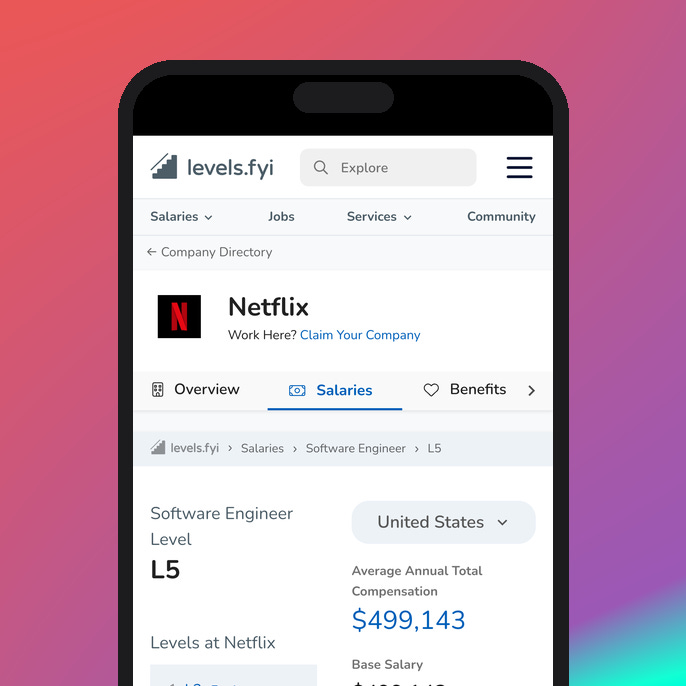
3. Pay
Netflix is known to pay employees very well. This is very intentional and explained in No Rules Rules. The primary motivating factors behind how they pay their employees are:
RSUs and bonus are terrible motivators. Studies show the possibility of a large bonus based on performance doesn’t actually improve performance. So Netflix doesn’t have bonuses or RSUs. They pay everything in cash.
Only hire people you want to pay top of market for. This is inline with Netflix’s goal of talent density and ensures Netflix pays well enough that employees want to stay there.
Encourage employees to check out other opportunities. Netflix encourages employees to check out other opportunities and to understand their worth on the market. There isn’t a fear of employees leaving because Netflix wants to retain employees by ensuring their employees don’t want to work anywhere else. Netflix aims to retain employees based on merit, not control tactics.
Netflix’s primary approach regarding pay is the market determines pay and performance dictates employment.
They have a motto of "adequate performance gets a generous severance”. If an employee’s performance isn’t absolutely stellar, they’ll let that employee go. There’s no PIP, just a generous severance to give them time to find another position.
Netflix only keeps employees they would fight for if they had another offer. This is called their “Keeper Test” and is widely known throughout the industry. It’s just a way of identifying whether an employee’s work is up to par.
Essentially, Netflix wants to pay its employees well. Netflix knows it pays dividends to have the best employees, retain them, and let them do good work (more on this in the next section).
Your takeaway: Know your worth on the market and seek employment accordingly. This gives you the upper hand in your employment situation. Your employer can level the playing field by treating you properly.
4. Promote freedom and trust
Netflix strongly upholds the idea that processes inhibit innovation and the companies that stay ahead in tech are the companies that innovate the most.
This was refreshing to read because too many previously great companies are forgetting this as they become bogged down by processes and priorities shift away from what’s truly important.
The tweet below exemplifies this perfectly: Companies start losing when they shift away from innovating and toward maximizing internal processes.
Netflix has taken a simple approach to ensure innovation stays alive: They’ve gotten rid of any process that isn’t safety-critical. Netflix has a motto that replaces most processes: “Act according to Netflix’s best interest”. They’ve acknowledged that processes waste time, often require micromanagement (which wastes more time), and just plain suck.
Netflix also promotes freedom by allowing employees to drive their own work and make the large decisions that work requires. Netflix calls the person making a large decision the “Informed Captain”. They know the most about the decision and context surrounding it, so they should be the one to make that decision.
This has created a culture of ownership and responsibility: Employees own their work and are responsible for the outcome. This allows employees to have a very real impact on company success and creates an environment of ownership and responsibility.
Interestingly, Netflix has found this to create a much greater long-term incentive for employees to stay invested in the company than RSUs that vest years out. It turns out that the best engineers just want the freedom to build the cool things they want to build—who would have thought?
So what’s the key to all this working? Just like the other sections, it’s hiring the right people. This is another reason Netflix is so picky about who they hire. Freedom works incredibly well when you only hire high performers that won’t take advantage of it.
Your takeaway: Seek companies that will give you the freedom to achieve your best work. Freedom is always a net positive for employees.
5. Lead with context instead of control
So how should managers promote a culture of freedom and trust? Managers still have their objectives. How do they ensure they’re met with so little oversight over their reports?
No Rules Rules calls this leading with context instead of control. Instead of micromanaging employees and deciding for them, managers should give reports enough context for employees to make the decision themselves. It’s the manager’s job to guide their employees, not make choices for them.
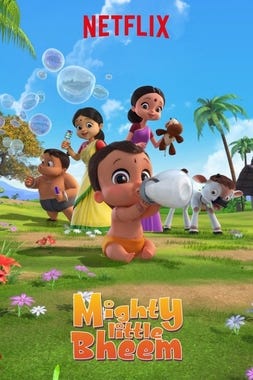
There are many examples in No Rules Rules of Netflix employees making a multi-million dollar decision to create original content or bid for content. Instead of making the decision for them, upper level management provided them with complete context to make the decision themselves.
In most cases, these decisions end up working out for Netflix. In some cases they end up being the wrong decision, but it was unlikely someone else further from the decision would have been able to make that decision better.
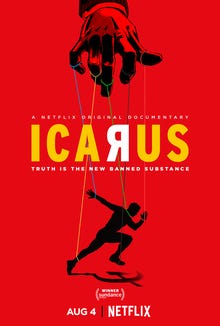
Netflix admits that leading with control is sometimes necessary (in safety-critical industries like oil, manufacturing, etc. where someone can get seriously injured), but context works much better in creative settings which software engineering is.
Your takeaway: Software engineering is a creative task. Most people focus far too much on the programming and far too little on the problem. The critical part of the job is solving the problem and the most successful engineers are those capable of getting creative to do so. If you’re working in an environment that doesn’t let you get creative, you won’t live up to your full potential.
My verdict: Definite Read
This book is a 9/10 and a definite recommend from me.
Let me know what you think of Netflix’s culture and leave a comment if there’s anything from No Rules Rules that I missed.
I’m focused on the following three books in June:

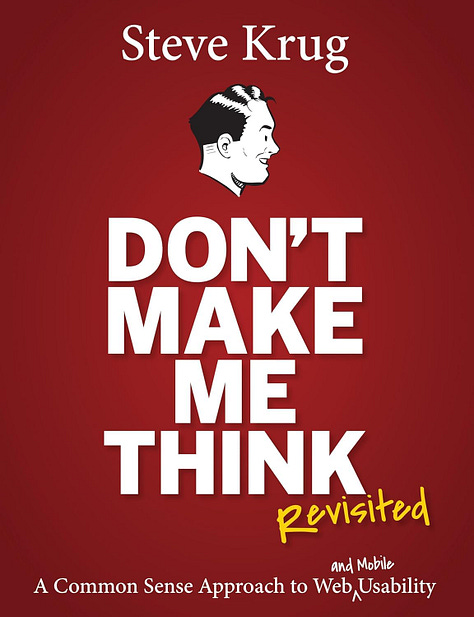

The War of Art by Steven Pressfield
Don’t Make Me Think (revisited) by Steve Krug
The Mathematics of Machine Learning by Tivadar Danka (probably won’t finish this in a month)
Feel free to read all or any of them with me. 😊
Always be (machine) learning,
Logan


